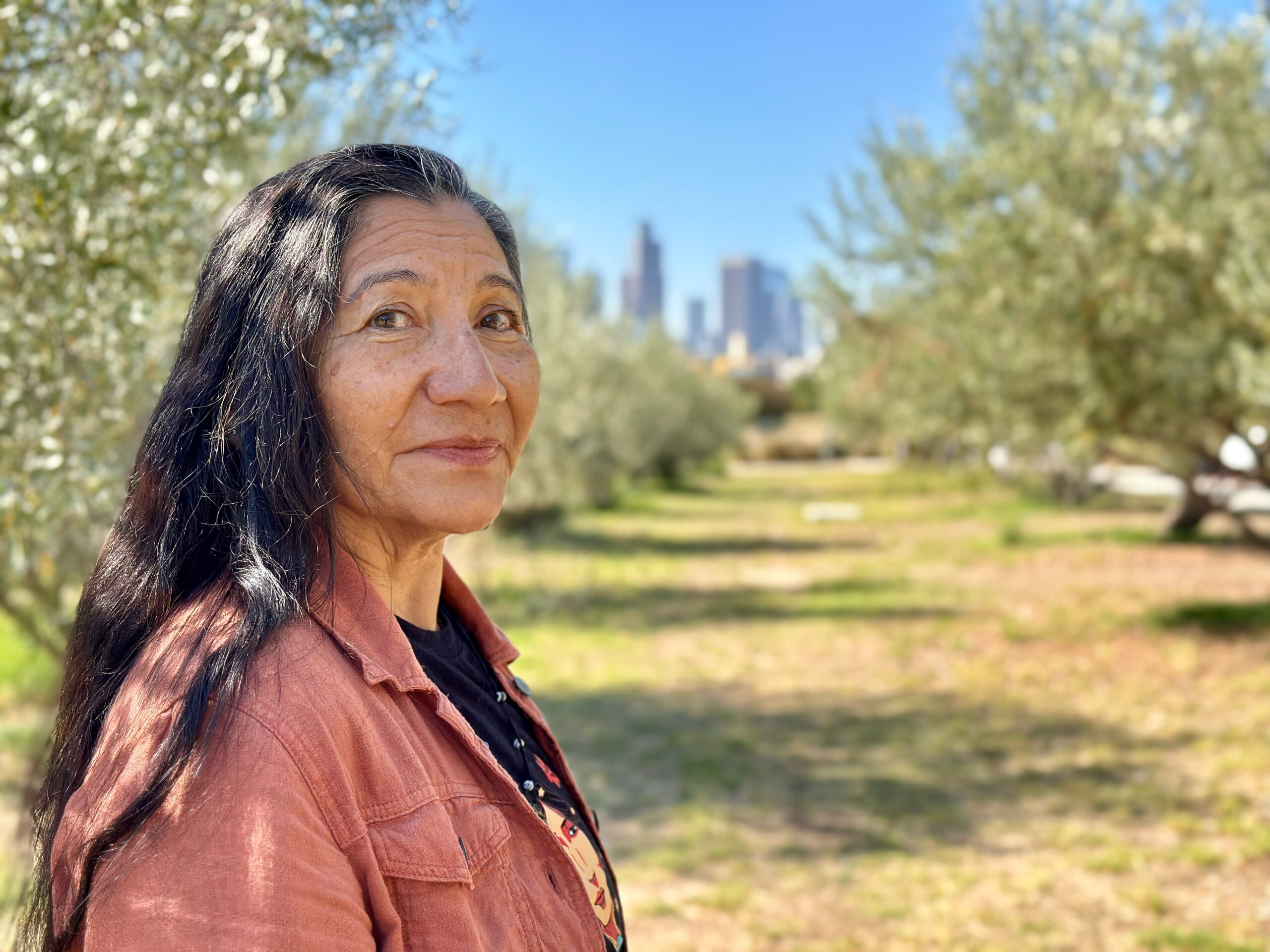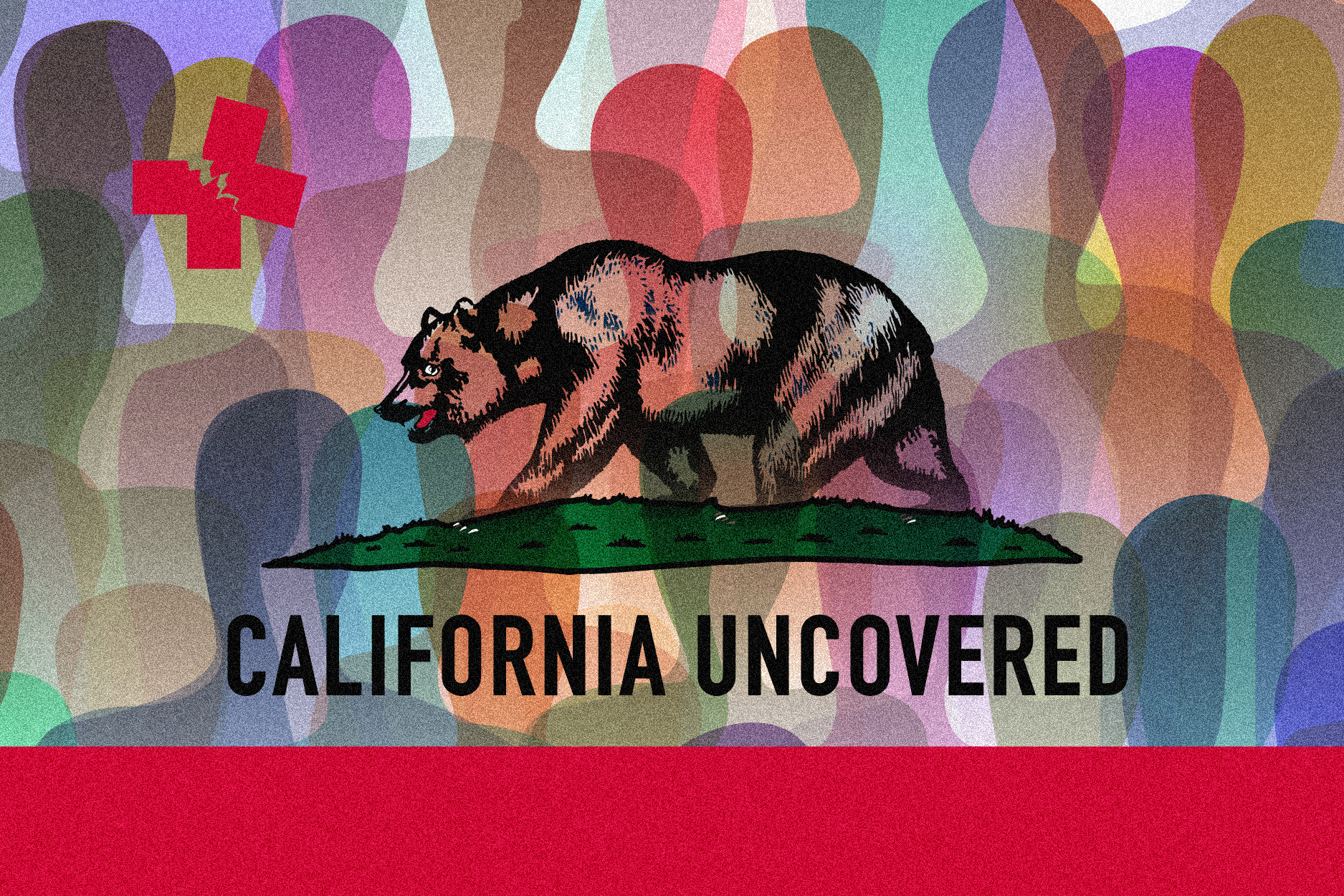Rossana Pérez was arrested by a death squad and imprisoned in her native El Salvador for months before arriving as a refugee to Los Angeles more than 40 years ago. Now, the Los Angeles professor, writer and activist supports others who, like her, have overcome unthinkable trauma in their home countries to continue their lives in the United States.
But for Pérez, as painful as the ongoing immigration raids in Los Angeles have been, Latinos and other immigrant communities need only look to history to find hope, examples and guidance for how to survive this tumultuous time.
Ongoing, aggressive immigration raids since June have impacted the physical and mental health of Latinos across Los Angeles. But not everyone is able to turn to a doctor or therapist for aid. Elders like Pérez, 67, often provide vital support and direction too.
I first met Pérez in late July. While I was speaking with doctors, therapists and support groups for Latinas and Latinos affected by the roving immigration patrols and raids, colleagues in academia and journalism recommended I contact her. She agreed to meet in a cafe at a local university south of downtown Los Angeles. Though I’d only ever seen her in a video in Capital & Main’s Excavating the Future series, I immediately recognized her by her style of dress and her face. The short, brown-skinned woman in a flowing white cotton skirt and matching huipil, a hand-woven, rectangular stitched tunic common among Indigenous women in parts of Central America and Mexico, wore her hair pulled back in a single braid. She looked equal parts college professor and abuelita — the kind of person who easily earns people’s confidence and trust. And for undocumented Angelenos and the region’s Central American diaspora, she has. I also recognized in her some of the facial features of Sara Aguilar, her documentarian daughter who is making a film about her mother and their family history.
Once we sat down, it didn’t take long for the immigration dragnet that has enveloped Southern California during President Donald Trump’s second term to come up in conversation. Pérez mentioned that she has stopped going for runs for exercise at local parks since the raids began in June. She volunteers at El Centro Cultural Techantit, a community support group in Los Angeles’ MacArthur Park for Indigenous refugees from Central America. But one of her daughters asked her not to go to MacArthur Park the day of the July 7 military convoy and photo op. I told her I was there and that my 9-year-old daughter recently said that living in Los Angeles right now feels like being part of the Rebellion in the Star Wars universe.
“We’re the resistance,” Pérez said with a laugh. In a more serious but comforting tone, she said we need to acknowledge how people are feeling and validate their concerns, but also maintain a positive attitude and a sense of hope, because the raids will eventually end.
Pérez has experience with repressive government tactics. She came to this country as a refugee with her daughter Sara in 1983 after spending 10 months in a women’s prison in her native El Salvador. Yet she also offers an example of how people rebuild and maintain community. Pérez is co-founder of the first university-level Central American Studies department at California State University, Northridge. (The program is now named Central American and Transborder Studies). Full disclosure: I also teach at CSUN as a part-time instructor. In addition to Centro Cultural Techantit, Pérez also works with El Rescate, a Los Angeles nonprofit that advocates for the rights of refugees and immigrants.
Earlier this summer, Pérez told me, she was co-facilitating a reading group at Centro Cultural Techantit on the Popol Vuh, the K’iche’ Maya book of creation. Pérez and her co-facilitators approached a guest speaker, a K’iche’ Maya spiritual leader, to speak. But instead of discussing the text, the K’iche’ woman could only bring herself to talk about how fearful she was about deportation. A friend of her son had been taken by immigration authorities; neighbors had been abducted as well. The guest confided that she was considering returning to Guatemala, then apologized for sharing so much, rather than discussing the Popol Vuh.
“You don’t have to be sorry,” Pérez told the woman. “That’s what community is about: We must hold space for you.”
The feeling of fear during the raids is natural, Pérez said to me. And for many immigrants and refugees, stories and images of people just like them being taken away by armed, masked men are painful reminders of civil war, drug-trafficking narcos, paramilitary and armed forces from the places they fled.
Latino citizens and immigrants alike need to remember those experiences are in the past and we are not doomed to repeat them, she said. “We have survived. And we will survive this,” Pérez said.
Pérez has also experienced the impact on young people, like at a food distribution event in July at El Centro Cultural Techantit where she noticed teenagers lingering outside. After inviting them inside, she learned the teenagers were picking up food for their parents and other family members they thought were more likely than them to be targeted by immigration agents.
“It’s in a sense beautiful, but also sad: that a child, a teenager, carries that burden and worry for their parents’ wellbeing,” Pérez said.
Parents and other adults, for their part, need to put children’s fears in context and help explain and understand the raids, Pérez told me. But adults need to recognize the experience of children and young people is necessarily different, she added. The isolation during the COVID-19 pandemic harmed them, fueling anxiety and depression. Public education officials who considered a return to online education in light of ongoing raids need to recognize that pivot could again worsen mental health, Pérez said.
For young adults in Los Angeles, Chicago and other big cities being targeted by Trump’s mass deportation operations, witnessing raids offers a real-time lesson in American immigration policymaking and how historical events we experience today are later crafted and taught, Pérez said. The ensuing legal fights also offer an opportunity to understand the United States Constitution, application of law and civic responsibility, she added.
Pérez said the fear engendered by the raids and the Trump administration’s rule by chaos reminds her of the time of the 1973 coup in Chile, which she studied.
“It creates a sense that we don’t have control of our life,” Pérez said. “People need to know they are in control; you have rights.”
To underscore her point, Pérez recalled when a death squad came for her in El Salvador. She was at a friend’s home. Sara was just 18 months old.
Men in fatigues came to the door, asking for Pérez. While her friend told her to run, she remembers saying, “No, I have nothing to hide. I am not going to give them an excuse to kill us.”
When the squad asked for her identification, she questioned them. Pérez said they were taken aback by her boldness. She said she was reminding herself to stay calm for the children, who were scared. Pérez was blindfolded and taken away, first for eight days in a clandestine prison. Then she was transferred to a women’s prison for 10 months.
With the escalation of violence in Los Angeles and other cities, there is bound to be a sense of hopelessness, Pérez said. In El Salvador, her body was imprisoned, she said, but her spirit, mind and hope were not. We create our own meaning in these moments, Pérez said. Our safety comes through community action: going on neighborhood patrols and protest marches; making demands of elected officials; supporting friends, family and neighbors; or simply offering food to someone in need.
“We have to know we are the architects of our own destiny. I won’t just sit in my house, waiting for someone to tell me what to do,” Pérez said. “This is going to have an end and we are going to be OK.”
Copyright 2025 Capital & Main


 The SlickJanuary 27, 2026
The SlickJanuary 27, 2026
 Column - State of InequalityJanuary 29, 2026
Column - State of InequalityJanuary 29, 2026
 Latest NewsFebruary 3, 2026
Latest NewsFebruary 3, 2026
 Dirty MoneyJanuary 30, 2026
Dirty MoneyJanuary 30, 2026
 Featured VideoFebruary 4, 2026
Featured VideoFebruary 4, 2026
 The SlickFebruary 2, 2026
The SlickFebruary 2, 2026
 Column - State of InequalityFebruary 5, 2026
Column - State of InequalityFebruary 5, 2026
 Column - California UncoveredFebruary 6, 2026
Column - California UncoveredFebruary 6, 2026

